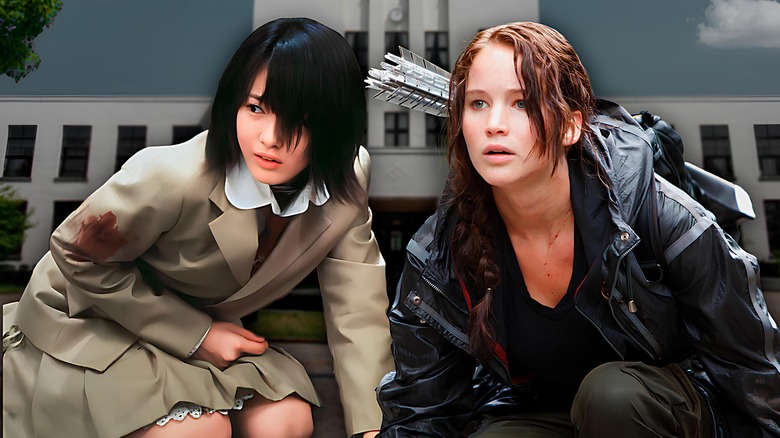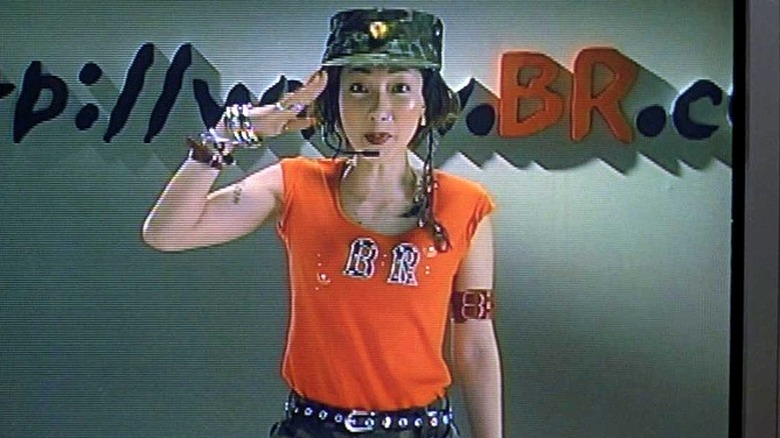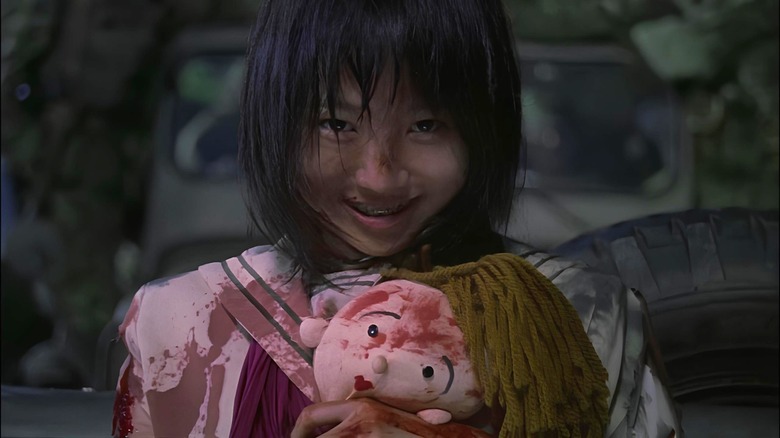An R-Rated Hunger Games Precursor Was Blocked In Multiple Countries - Here's Why
While "The Hunger Games" is a hit franchise known worldwide, some fans of international cinema are likely well aware that there is another movie out there with a very similar idea at its heart. Not only did this movie come out first, but it also predated the 2012 adaptation and Suzanne Collins' original 2008 novel quite a bit.
Originally released in 2000, "Battle Royale" is set on an island and follows a government branch in Japan that kidnaps a group of 9th graders and forces them to fight to the death on an island. Sound familiar? Furthermore, much like "The Hunger Games," it's also based on a similarly themed book, wherein a tyrannical, fascist government carries out the program as a fearful warning to keep young people of the populace in line. Unlike "The Hunger Games," however, the "Battle Royale" movie excises just about all of the dystopian future stuff in favor of the pure drama and chaotic bloodshed of the game. What's more, at an impressive 88% on Rotten Tomatoes, the film is also better reviewed than all but one of the movies in the "Hunger Games" franchise, 2013's "Catching Fire."
If you do watch "Battle Royale," however, you may want to usher the kiddies out of the room. Despite its grim subject matter, "The Hunger Games" movies and books are aimed squarely at a YA audience, while "Battle Royale" earns every bit of its hard R-rating and, for a time, why the latter was essentially banned in several countries.
What countries banned - or tried to ban - Battle Royale?
The initial attempts at censoring "Battle Royale" actually began in Japan. There, in the film's homeland, government officials attempted to ban Koushun Takami's novel of the same name as well as the film adaptation. Of course, as is the case with attempting to ban anything from music to books to movies, this naturally led even more people to want to experience the novel and film's extreme story.
As for places where "Battle Royale" was restricted outside of Japan, the film was banned from being shown on TV in South Korea, a fact that could be considered somewhat ironic, especially for film fans who recall that the country produced brutal modern classics like "Oldboy" and "I Saw the Devil," as well as the television series "Squid Game." The film was also considered to be a form of "youth-endangering media" in Germany, a designation that led to copies of "Battle Royale" being confiscated. However, this was eventually reversed in 2017, and the film was allowed to be sold in Germany with no further restrictions.
As for the United States, "Battle Royale" was never banned, but there was a certain level of controversy surrounding it. This came from the fact that movies like "Natural Born Killers" were thought to have inspired events like the Columbine shooting. For these reasons and others, the movie didn't receive an official release in the US until 2010.
Just be ready for a much more extreme take on the idea
"Battle Royale" in all its forms is incredibly violent and digs deep into the cruel reality that such games would incite. As some students adapt quickly, willingly murdering other teenagers with reckless abandon, others refuse to play at all and are either killed or die by suicide as a result.
Furthermore, far from being generally random strangers who don't know each other, as is the case in "The Hunger Games," the characters in "Battle Royale" are actually classmates, a factor that makes the story even more twisted and disturbing. All the same, there is another element that the preceding story shares with its forebearer.
The two central characters of "Battle Royale," Shuya (Tatsuya Fujiwara) and Noriko (Aki Maeda), also fall in love in the midst of the games and try to escape them together, just as Katniss (Jennifer Lawrence) and Peeta (Josh Hutcherson) do in "The Hunger Games." Of course, standing in their way are explosive collars, blood-frenzied students, and unstable teenagers, a factor that makes the proceedings all the more exciting, if a little less inspirational. With that in mind, as we warned above, do not go into the Japanese film with the expectation that things will play out quite as cordially as they do in the similar-yet-very-different YA series.


